talk
Summer Program Information Session: Advanced Levels - Live on Zoom
Are you thinking of returning to the Summer Program to continue your advanced studies? Join Summer Program faculty and staff for a brief information session about YIVO’s advanced levels. Open to graduates of YIVO’s intermediate levels and those with comparable proficiency, this session will cover the structure of YIVO’s advanced levels, the admissions process, and more, with time for questions from prospective Summer Program students.
The session will be conducted in Yiddish and is entirely optional (prospective students are not required to attend).
Ticket Info: Free; registration is required.
Presented by:
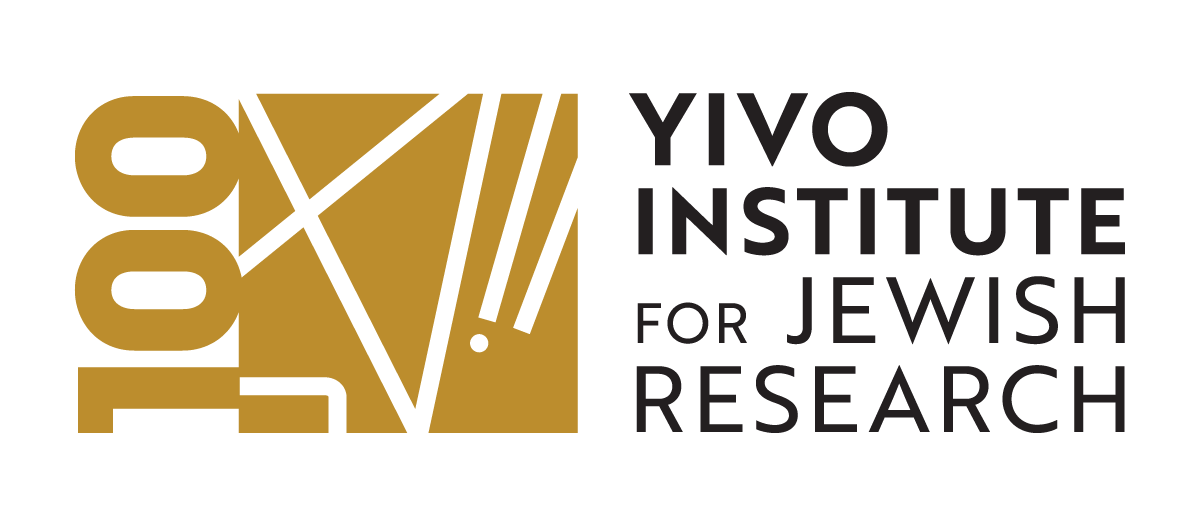
talk
book talk
Sounds of Survival: Polish Music and the Holocaust - In-person Program
Sounds of Survival explores the central role played by Jews in creating classical music in Poland. It examines an integrated Polish and Polish Jewish musical community as its members contended with antisemitism in the 1930s, attempted to survive the Nazi occupation, and established a renewed musical culture amid the ashes of World War II and the Holocaust. Reconstructing these musicians' lives from the 1920s into the 1950s, Mackenzie Pierce argues that despite nearly unimaginable violence, many Polish musicians treated the war as a time of reinvention and cultural preservation. Their faith that music was a source of cultural continuity, however, also marginalized experiences of wartime loss, especially those of Jewish victims and survivors of the Holocaust. Sounds of Survival not only reveals that the Holocaust was a central event within musical culture in Poland; it also shows why its musical aftermath has been difficult to hear.
About the Author
Mackenzie Pierce is assistant professor of musicology at the University of Michigan, Ann Arbor and author of Sounds of Survival: Polish Music and the Holocaust (University of California Press, 2025). He is a scholar of twentieth-century musical culture in Eastern Europe, with a focus on Polish-Jewish relations and classical music. Active in both the US and Europe, his research has been supported through fellowships from the American Council of Learned Societies, the United States Holocaust Memorial Museum, and the Polin Museum of the History of Polish Jews in Warsaw.
Ticket Info: Free; registration is required.
Presented by:

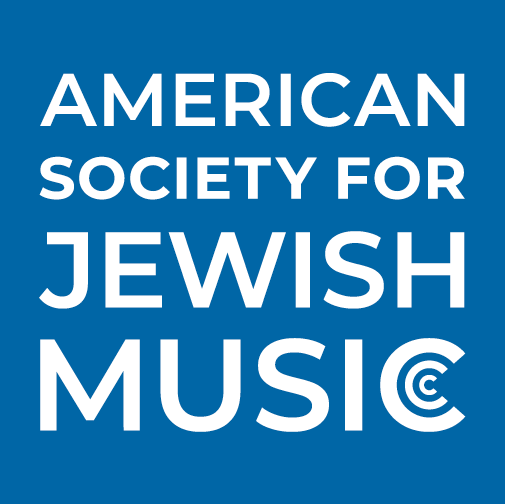
book talk
book talk
Confronting Representations of Black People in Yiddish Culture - Live on Zoom
Scholars have long argued that the Yiddish press consistently condemned discrimination against African Americans and emphasized parallels between Jewish oppression in Eastern Europe and Black life in the United States. In Crude Creatures, Gil Ribak challenges this view, showing that it reflects only a narrow portion of Jewish representations of Black people during the immigration era.
Drawing on previously unexplored Yiddish newspapers, theater, and literature from Eastern Europe and the United States through 1929, Ribak exposes a gap in existing scholarship. Although Jewish writers frequently denounced lynching, racial violence, and segregation, they often portrayed Black Africans and African Americans using crude stereotypes. Many Eastern European Jews encountered Black people only after immigrating, yet brought with them preconceived images shaped by rabbinic exegesis, pious advice, travel narratives, folklore, scientific explorations, pulp literature, press reports, political rhetoric, and educational materials. These depictions cast Black people as cannibals, oversexed, prone to violence, childlike, or just happy-go-lucky people. Crude Creatures revises the overly optimistic narrative of Black-Jewish relations and reveals how immigrant cultures adapted to America’s racial hierarchy.
Join us for a discussion about this book with Ribak, led by Clinical Assistant Professor at University of South Carolina Devin Randolph.
About the Speakers
Gil Ribak is the Shirley D. Curson Associate Professor at The Arizona Center for Judaic Studies at the University of Arizona. Born and raised in Israel, Ribak came to the U.S. on a Fulbright Fellowship and completed a Ph.D. in history at the University of Wisconsin-Madison. He held several academic positions, such as the Director of the Institute on Israeli-American Jewish Relations at the American Jewish University in Los Angeles. His book, Gentile New York: The Images of Non-Jews among Jewish Immigrants, was published by Rutgers University Press in 2012. In 2021-2022, Ribak served as the European Union's Marie S. Curie Senior Fellow at the Freiburg Institute for Advanced Studies at the Albert-Ludwig University in Freiburg, Germany.
Devin Randolph is Clinical Assistant Professor in the College of Education at the University of South Carolina. He studies the everyday experiences of targeted youth and systemic inequities. His research includes work with Jewish and African American-understanding the historical alliance, divergence and convergence and contours of racism and racial antisemitism. Randolph earned his Ph.D. in Foundations of Education from the University of South Carolina.
Ticket Info: Free; registration is required.
Presented by:

book talk
book talk
Pathways: Seven Short Stories by I. L. Peretz - In-person Program
The new graded reader Afn veg: Zibn dertseylungen fun Y.-L. Perets (Pathways: Seven Short Stories by I. L. Peretz), consists of seven classic short stories by the great author, I. L. Peretz, abridged and adapted for students by Moishele Alfonso.
Afn Veg features a side-by-side glossary, discussion questions, and audio recordings. This collection of adapted Peretz short stories gives the reader access to the very best that Yiddish literature has to offer, yet at such a level that even advanced beginners can comprehend it.
Every short story is divided into smaller chapters, with discussion questions at the end of each chapter. One feature that makes this reader so useful for students is the side-by-side glossary. The more difficult words and expressions appear in bold letters; right next to the Yiddish text is a glossary containing their translation, and in some cases, also the pronunciation. The book is a tremendous contribution to the learning materials available to today’s Yiddish students.
Join YIVO and League for Yiddish for a celebration of this new publication. Light refreshments will be served during the program.
This lecture will be held in Yiddish in person only.
About the Speaker
Moishele Alfonso received his B.A. in German, French and Italian from the University of Memphis. He attended the YIVO-Bard Uriel Weinreich Summer Program in 2018 and participated in the Yiddish Book Center’s Yiddish Pedagogy Fellowship (2018-19) and the Yiddish Pedagogy Practicum (2021-22). He has taught Yiddish at the Yiddish Book Center, the Workers Circle, and at Kadimah in Melbourne, Australia. In 2021-2022, Moishele transcribed Isaac Bashevis Singer’s book, Sonim: di geshikhte fun a libe (Enemies: a Love Story) into standardized Yiddish from the orthography used in its original serialized publication in the Forverts (1966). Moishele’s version was published in 2022 by Olniansky Farlag in Sweden and is the first time Sonim has ever appeared in book form in Yiddish.
Ticket Info: Free; registration is required.
Presented by:

book talk
lecture
The Shtetl: Myth and Reality - Live on Zoom
Even those who do not know much Yiddish have probably heard the word shtetl,” but what does that word mean exactly? Can we just say that it was a small town in Eastern Europe with a lot of Jews—and leave it at that? Or was the shtetl that nostalgic world of “tradition” so lovingly celebrated in Fiddler on the Roof? How are we to understand imaginary shtetls like Sholom Aleichem’s Kasrilevke, where the “little people” ran around, talked non stop, and tried to make sense of a world they could no longer understand understand or control?
Indeed the “shtetl” meant many things to many people. For many Zionists and Jewish leftists, the shtetl was a pathetic symbol of Jewish backwardness. Others cherished it as a place of real Jewishness, that fixed point that gave Jews in the diaspora the feeling of being home. The destruction of the Holocaust encouraged this nostalgia for the lost shtetl, especially as many Jews in the post-war world, newly comfortable and secure in their new homes, showed a new interest in their ethnic roots.
In this lecture, YIVO Visiting Research Historian Samuel Kassow will explore the “real shtetl” and the “imagined shtetl,” which both formed an integral part of Eastern European Jewish peoplehood.
About the Speaker
Samuel Kassow, Charles H. Northam Professor of History at Trinity College, holds a PhD from Princeton University and is a Fellow of the American Academy of Jewish Research. From 2006 until 2013, he was the lead historian for two galleries of the POLIN Museum of the History of Polish Jews in Warsaw, which opened in 2014. Professor Kassow is the author of Who Will Write Our History? Emanuel Ringelblum and the Secret Ghetto Archive (Indiana University Press, 2007), which received the Orbis Prize of the AAASS; was a finalist for a National Jewish Book Award; and has been translated into eight languages. White Goat Press recently published his translation of Warsaw Testament by Rokhl Auerbach, which received a National Jewish Book Award. A child of Holocaust survivors, Professor Kassow was born in a displaced-persons camp in Germany.
Ticket Info: Free; registration is required.
Presented by:

lecture
discussion
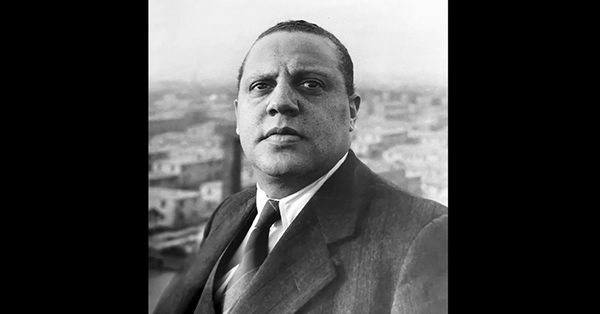
Horace Cayton: Black Renaissance Man and Raconteur - Live on Zoom
In this talk, writer Jeffery Allen will discuss the historical significance of Horace Cayton, who became the romantic partner to Lore Segal soon after the end of World War II. Allen will position Cayton, a well-known intellectual and political figure known for his quips and colorful personality, within the larger framework of the Harlem Renaissance, as a member of the generation termed the “New Negro” and as a part of the burgeoning Civil Rights Movement. Cayton served as the inspiration for Lore's character of Carter Bayoux in her best-known novel, Her First American.
About the Speaker
Jeffery Renard Allen is the award-winning author of six books of fiction and poetry, including the celebrated novel Song of the Shank, which was a front-page review in both The New York Times Book Review and The San Francisco Chronicle. Allen’s other accolades include The Chicago Tribune's Heartland Prize for Fiction, The Chicago Public Library’s Twenty-First Century Award, the Ernest J. Gaines Award for Literary Excellence, a grant from Creative Capital, a Whiting Writers' Award, a Guggenheim fellowship, a NYFA grant, residencies at the Bellagio Center, Ucross, The Hermitage, VCCA, Monson Arts, and Jentel Arts, and fellowships at The Center for Scholars and Writers, the Johannesburg Institute for Advanced Studies, and the Schomburg Center for Research in Black Culture. He was a finalist for both the PEN/Faulkner Award and the Carnegie Medal for Excellence in Fiction. Allen is the founder and editor of Taint Taint Taint magazine and is the Africa Editor for The Evergreen Review. His latest books are the short story collection Fat Time and the memoir An Unspeakable Hope, the latter co-authored with Leon Ford. Allen is at work on several projects, including a memoir entitled Mother-Wit, a book of poems called No Borders, and the short story collection Try Me. Allen makes his home in Johannesburg and New York. Find out more about him at www.writerjefferyrenardallen.com.
Ticket Info: Free; registration required
Presented by:
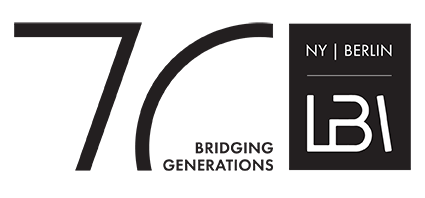
discussion
the blavatnik chamber music series at cjh
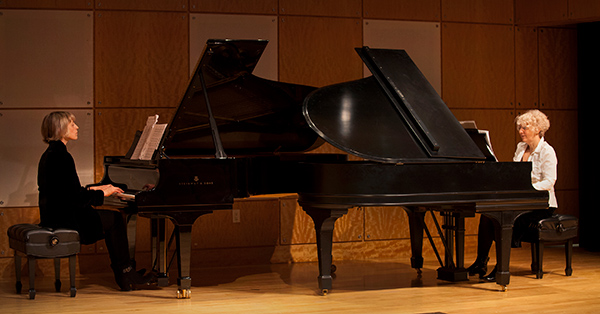
Keyboard Kaleidoscope: Three Pianists on Two Pianos: Phoenix Chamber Ensemble Performs Mozart, Rachmaninoff, Schnittke, and Bizet – In-Person Program and Live on YouTube
Join Phoenix Chamber Ensemble pianists Vassa Shevel and Inessa Zaretsky with guest artist Ellen Braslavsky (piano) for an evening of Mozart, Rachmaninoff, Schnittke, and Bizet.
Program:
Wolfgang Amadeus Mozart, Sonata in D Major, K. 448, for Two Pianos, Four Hands
Sergei Rachmaninoff, Suite No.1. Op.5 for Two Pianos, Four Hands
Alfred Schnittke, Gogol Suite, arranged for two pianos by Valery Borovikov
Georges Bizet, Carmen Suite for Piano Six Hands, arranged by J. Kowalewski
Founded in 2005 by pianists Vassa Shevel and Inessa Zaretsky, the Phoenix Chamber Ensemble has become a vital part of the New York classical community, presenting more than 70 public concerts at the Center for Jewish History. The ensemble has garnered a devoted following with its innovative programming and sensitive interpretations, earned an international reputation presenting concerts in Russia, Poland, Italy, and other European venues, and collaborated with numerous acclaimed guest artists, including clarinetist David Krakauer, the Grammy-nominated Enso Quartet, the Tesla Quartet, members of the Jasper String Quartet, the New York Little Opera Company, the Metropolitan Opera, and New York City Ballet.
Made possible by the Stravinsky Institute Foundation through the generous support of the Blavatnik Family Foundation.
Ticket Info:
In person: $15 general; $10 senior/student; $8 CJH member; click here to register
YouTube: Pay what you wish; click here to register
Presented by:

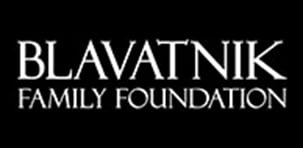
the blavatnik chamber music series at cjh
conversation
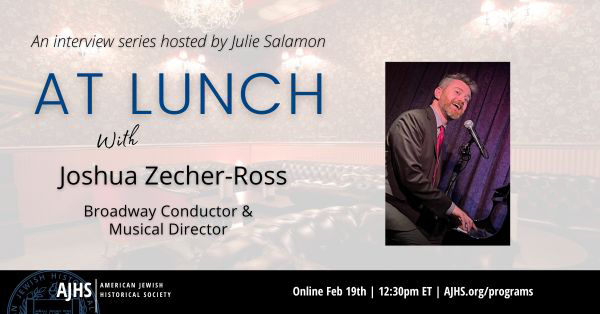
At Lunch with Joshua Zecher-Ross – Live on Zoom
Julie Salamon, New York Times best-selling author, sits down with Broadway conductor and musical director Joshua Zecher-Ross. Currently, the music director and conductor of Operation Mincemeat, now playing at The Golden Theatre and the score supervisor for The Queen of Versailles at the St. James Theatre. Previous Broadway credits include Water for Elephants, Be More Chill, and Once Upon a One More Time. Joshua has worked as a music director, conductor, arranger, and electronic music designer for dozens of shows across the country. He has performed in New York City at 54 Below, Joe’s Pub, Green Room 42, The Laurie Beechman, Birdland, The Duplex, and Feinstein’s at Nikko. He also works as a music supervisor, instructor, and accompanist at NY Film Academy Musical Theatre Program & Actor Therapy. He is a graduate of NYU: Steinhardt.
Ticket Info: Free; register online for a Zoom link
Presented by:

conversation
lecture
Denialism: Polish Style - Live on Zoom
Elzbieta Janicka focuses on the case of the former German Nazi death camp Treblinka, the place of murder and (un)rest of nearly one million Jews from several European countries, the majority from Poland. While keeping in mind that “Treblinka” is as an umbrella term for the forced labor camp Treblinka I (1941-1944), the extermination camp Treblinka II (1942-1943), and a railway station at Treblinka the village, Janicka examines symbolic topography, such as the symbols and narratives that are imprinted into these sites under the auspices of the Treblinka Museum. Regarding the unrestricted Polish bottom-up and top-down fight to “conquer the space” of the Holocaust and make it symbolically profitable for Poland, Janicka raises the question: Why doesn’t the present Polish strategy of “promoting Polish martyrdom upon the Jewish one” trigger an international scandal and condemnation?
Janicka argues that while Polish cultural institutions do not deny the Holocaust itself, they practice a form of denialism by obscuring the reality of Polish involvement in the Holocaust. This lecture fits into a broader debate about Polish public institutions that promote a counter-history of the Holocaust and have at their disposal extraordinary means of propaganda both within Poland and abroad.
About the Speaker
Elzbieta Janicka is a historian of literature, cultural anthropologist, and visual artist. She received her M.A. at the Université Paris VII Denis Diderot and her Ph.D. and postdoctoral degree at Warsaw University. Janicka is the author of Sztuka czy Narod? [Art or the Nation?] (Krakow: Universitas, 2006) and Festung Warschau [Forteress Warsaw] (Warszawa: Krytyka Polityczna, 2011). She co-authored Philo-Semitic Violence. Poland’s Jewish Past in New Polish Narratives (Lanham, MD: Rowman & Littlefield, 2021; with Tomasz Zukowski) and This Was Not America: A Wrangle Through Jewish-Polish-American History (Boston: Academic Studies Press, 2022; with Michael Steinlauf). Her individual exhibitions are: Ja, fotografia (1998); Miejsce nieparzyste [The Odd Place] (2006); and Inne Miasto [Other City] (2013, with Wojciech Wilczyk). Her research pertains to the identity and community building function of Polish antisemitism as well as the place and role of the Polish majority in the structure of the Holocaust. She works at the Institute of Slavic Studies of the Polish Academy of Sciences.
Ticket Info: Free; registration is required.
Presented by:

lecture
book talk
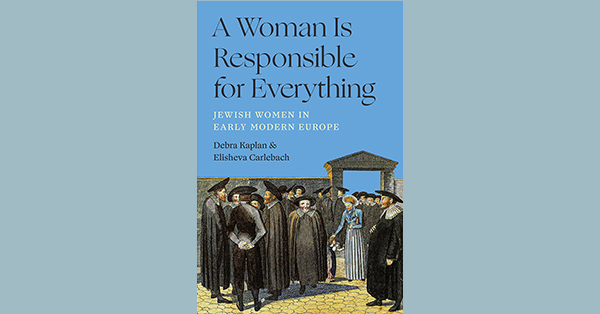
A Woman Is Responsible for Everything: Jewish Women in Early Modern Europe – In-Person Program
In small villages, bustling cities, and crowded ghettos across early modern Europe, Jewish women were increasingly active participants in the daily life of their communities, managing homes and professions, leading institutions and sororities, and crafting objects and texts of exquisite beauty. A Woman Is Responsible for Everything marshals a dazzling array of previously untapped archival sources to tell the stories of these women for the first time.
Join us for this important and illuminating discussion with authors Debra Kaplan and Elisheva Carlebach about the kehillah, a lively and thriving form of communal life that sustained European Jews for three centuries. They paint vibrant portraits of Jewish women of all walks of life, from those who wielded their wealth and influence in and out of their communities to the poorest maidservants and vagrants, from single and married women to the widowed and divorced. We will follow them into their homes and learn about the possessions they valued and used, the books they read, and the writings they composed. Speaking to us in their own voices, these women reveal tremendous economic initiative in the rural marketplace and the princely court, and they express their profound spirituality in the home as well as the synagogue. Mirjam Thulin, Director of Research and Associate Director of the Institute for Advanced Research at the Center for Jewish History, will moderate. A reception will follow the program, and the book will be available for purchase and signing.
About the Speakers
Debra Kaplan holds the Samuel Braun Chair for the History of the Jews in Germany at Bar-Ilan University. A social historian of premodern Ashkenaz, she is the author of Beyond Expulsion: Jews, Christians and Reformation Strasbourg (Stanford University Press, 2011) and The Patrons and their Poor: Jewish Community and Public Charity in Early Modern Germany (University of Pennsylvania Press, 2020) and with Elisheva Carlebach, A Woman is Responsible for Everything: Jewish Women in Early Modern Europe (Princeton University Press, 2025). Kaplan is on the board of directors of the Leo Baeck Institute Jerusalem and the Historical Society of Israel.
Elisheva Carlebach is Baron Professor of Jewish History, Culture and Society at Columbia University. Her books include The Pursuit of Heresy; Divided Souls: Converts from Judaism; Palaces of Time: Jewish Calendar and Culture, and Confronting Modernity, volume 6 in The Posen Library. She served as Editor of AJS Review and President of American Academy for Jewish Research. Carlebach was awarded Columbia’s Lenfest Distinguished Faculty Award, and recently, a mentorship award by the Association for Jewish Studies. Her most recent book is A Woman is Responsible for Everything, a new approach to the study of Jewish women, co-authored with Debra Kaplan. She is an officer on the Center for Jewish History’s Board of Directors.
Ticket Info: Pay what you wish; registration is required
Presented by:


book talk
concert
Leo Zeitlin and the Music of His World - In-person Program and Live on Zoom
Leo Zeitlin (1884–1930) was a composer, violinist, violist, and conductor born in Pinsk who specialized in classical works infused with Jewish themes. Best known for his Eli Zion for cello and orchestra, Zeitlin was an active member of the St. Petersburg Society for Jewish Folk Music and spent formative years teaching and conducting in Ekaterinoslav and Vilna before emigrating to New York, where he worked as an arranger and violist for the Capitol Theatre.
After his death, Zeitlin’s music fell into obscurity until cellist and musicologist Paula Eisenstein Baker (1939–2024) began studying and championing his work in the late 1980s. Eisenstein Baker’s publications in YIVO Annual and other journals, as well as her critical edition of Zeitlin’s complete chamber music for A-R Editions, were instrumental in reviving his legacy. This concert celebrates Eisenstein Baker’s scholarship and the recent donation of her archival collection to YIVO.
Performances by Julian Schwarz (cello), Marika Bournaki (piano), Peter Sirotin and Daniel Kurganov (violins), Colin Brookes (viola), and Ori Marcu (mezzo-soprano) will feature a variety of chamber and vocal music by Zeitlin, alongside works by composers with whom he was in dialogue, including Joseph Achron, Alexander Krein, Joachim Stutschewsky, Mikhail Gnesin, Lazare Saminsky, Joel Engel, Alexander Zhitomirsky, and Michael Lewin.
The Sidney Krum Young Artists Concert Series is made possible by a generous gift from the Estate of Sidney Krum.
This program is supported, in part, by public funds from the New York City Department of Cultural Affairs, in partnership with the City Council.
Ticket Info: Free; registration is required.
Presented by:


concert
lecture
"If It Was with Men, It Would Totally Miss the Point": Religious Women's Selichot Events in Israel - Live on Zoom
This presentation by Dr. Naomi Cohn Zentner and Dr. Abigail Wood examines a striking recent phenomenon in Israeli Jewish religious life: selichot events performed for and by Orthodox women in the weeks before the High Holidays. Drawing hundreds of participants, these gatherings combine collective singing, performances by well-known singers, and embodied devotional practices. Based on research funded by the Israel Science Foundation, the presentation analyzes how performance and participation function as sites of spiritual and musical labour, illuminating changing forms of religious creativity, leadership, and public culture in contemporary Orthodoxy.
About the Speaker
Abigail Wood is a senior lecturer in ethnomusicology at the Music Division, School of Arts, Culture and Hermeneutics, University of Haifa. Her research is primarily concerned with musical life in urban spaces, from contemporary Jewish music to the reflection of the Israeli-Palestinian conflict in the contested soundscapes of Jerusalem’s Old City.
Naomi Cohn Zentner is a lecturer in Bar Ilan University’s music department. In 2024, she held the Katz Fellowship at the University of Pennsylvania’s Katz Center for Advanced Judaic Studies and in 2019 she was a visiting fellow at the Oxford Seminar in Advanced Jewish Studies focusing on early Jewish music. Her research interests lie in historical ethnomusicology, religious aspects of Israeli popular music, and the cross-fertilization of Ashkenazi and Sephardi liturgical traditions.
Ticket Info: Free; registration is required.
Presented by:


lecture
book club
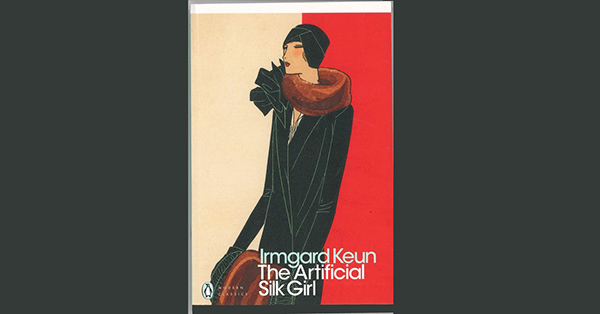
LBI Book Club: The Artificial Silk Girl - Live on Zoom
Professor Didem Uca will join LBI to discuss The Artificial Silk Girl
This enthralling tale of a “material girl” in 1930s Berlin is the masterpiece of a literary icon, rediscovered and restored to the same heights as such luminaries as Isherwood and Brecht.
In 1931 a young woman writer living in Germany penned her answer to Anita Loos’s Gentlemen Prefer Blondes and the era of cinematic glamour: The Artificial Silk Girl. Though a Nazi censorship board banned Irmgard Keun’s work in 1933 and destroyed all existing copies, the novel survived, as fresh and relevant today as the day it was written.
The Artificial Silk Girl is the story of Doris, beautiful and striving, who vows to write down all that happens to her as the star of her own life story. But instead of scripting what she hopes will be a quick rise to fame and fortune as either an actress or the mistress/wife of a wealthy man, she describes a slow descent into near prostitution and homelessness. Prewar Berlin is not the dazzling and exciting city of promise it seems; Doris unwittingly reveals a bleak, seamy urban landscape.
(Description: Penguin Random House).
Author Irmgard Kuen
Irmgard Keun (1905 – 1982) was a (non-Jewish) German novelist. She is noted for her portrayals of the life of women in the Weimar Republic as well as the early years of the Nazi Germany era. She was born into an affluent family and was given the autonomy to explore her passions. After her attempts at acting ended at the age of 16, Keun began working as a writer after years of working in Hamburg and Greifswald. Her books were eventually banned by Nazi authorities but gained recognition during the final years of her life. She was a romantic partner to the Jewish author Joseph Roth.
About Our Guest
Didem Uca is Assistant Professor of German Studies and associated faculty in the Departments of Women’s, Gender, and Sexuality Studies and Middle Eastern and South Asian Studies at Emory University. With a focus on intersectional approaches to post/migration cultures, Dr. Uca’s research has appeared in journals including Gegenwartsliteratur, Die Unterrichtspraxis / Teaching German, Seminar, and Monatshefte, for which she wrote about how the protagonist of Irmgard Keun's novel Child of All Nations can be interpreted as an adaptation of the character of Mignon from Johann Wolfgang von Goethe's Wilhelm Meister's Apprenticeship. As a literary translator from German and Turkish, her work has appeared in venues such as TRANSIT, Konturen, SAND Journal, and Turkish German Studies. A dedicated pedagogue, Dr. Uca's teaching has been honored with the Goethe-Institut/American Association of Teachers of German Certificate of Merit (2020) and the American Council on the Teaching of Foreign Languages German Special Interest Group's Early Career Award (2024).
Ticket Info: Free; registration required
Presented by:

book club
film screening
Outsider: Freud - In-person Program
Join YIVO for the New York premiere of Outsider: Freud, a journey into the life and work of Sigmund Freud in four acts, combining animation, dreams, and insights from leading psychoanalysts. The film explores Freud’s experiences of marginalization as a Jew in Vienna during Hitler’s rise and how these shaped his theories and personal life. Through an intimate lens, the film reveals new dimensions of Freud’s legacy, focusing on his impact on psychoanalysis, Judaism, and the power dynamics of being an outsider.
A Q&A with director Yair Qedar will follow the screening.
About the Speaker
Yair Qedar is an Israeli documentary filmmaker, social activist and former journalist. In his project “the Hebrews,” he has been chronicling the lives of Jewish and Israeli figures of the modern Hebrew literary canon. Qedar’s 19 feature-length documentaries have all premiered at film festivals and have won the director over 30 prizes. Qedar is also a leading LGBTQ activist and created the first Israeli LGBTQ newspaper.
Ticket Info: $15; YIVO members: $10
Presented by:

film screening
concert
Celebrating Vienna’s Center for Banned Music - In-person Program
Members of the Vienna Philharmonic with distinguished Czech pianist David Hausknecht celebrate the 20th Anniversary of Vienna’s Exilarte – Center for Banned Music and the 10th Anniversary of the University of Music and Performing Arts, Vienna’s Exilarte Research Center, with a performance of music by Gustav Mahler, Erwin Schulhoff, and Walter Bricht.
This concert honors the voices of those composers, performers, music researchers, and theater artists who were considered “degenerate” and were silenced by the Nazis during the Third Reich, and whose works have often been forgotten. For two decades, the Exilarte Center has served as a contact point and interface for the reception, research, preservation, and presentation of this important cultural heritage.
The concert will be followed by a reception.
Ticket Info: Free; registration is required.
Presented by:


concert
lecture
Educating for an Uncertain Future in Interwar Poland - Live on Zoom
In the two decades between the First and Second World Wars, Jewish parents in Poland faced a proliferation of choices when it came to educating their children. Each choice offered a vision of what future Polish Jews desired, what they expected, and the gap between the two. State schools taught in Polish (sometimes with a schedule to accommodate traditional religious observance), secularist Yiddish schools with strong ties to Jewish socialism and the labor movement, Hebraist schools promoting political and cultural Zionism, and religious schools that retained--or innovated upon--traditionalist educational models reflected different opinions for what Jewish children in interwar Poland would need in the present to secure their future. In this lecture, Elena Hoffenberg draws upon materials held by YIVO to explore how projections about the future in terms of work, culture, and politics guided parents, educational activists, and young people themselves. Choices as reflections of competing political and religious commitments, as well as material constraints, to better understand what Polish Jews expected for their individual and communal futures.
About the Speaker
Elena Hoffenberg is a PhD candidate in history at the University of Chicago and proud alumna of the YIVO zumer-program. Her work focuses on the Jews of interwar Poland to better understand how individual experiences and communal discourses that link family and futurity in periods of uncertainty and crisis. She is the 2024-2025 recipient of the The Aleksander and Alicja Hertz Memorial Fellowship and the Samuel and Flora Weiss Research Fellowship in Polish Jewish Studies at the YIVO Institute for Jewish Research.
Ticket Info: Free; registration is required.
Presented by:

lecture
lecture
English Jokes, Yiddish Punchlines: American Jewish Humor - Live on Zoom
In celebration of YIVO's 101st year, join us for our new Yiddish Civilization 101 series. Each program will highlight key topics in Ashkenazi history and culture, including shtetl life, Jewish humor, and Ashkenazi foodways, amongst others. Guided by expert scholars, each lecture will provide a greater understanding of Jewish life in Eastern Europe and its diasporas.
The Jake and Becky were celebrating their 50th wedding anniversary and returned to the same hotel, and the same room where they spent the first night of their honeymoon. At 2am, Jake nudges Becky awake and says, “Bekele — derlang mir di tseyner — ikh vil dir a bays gebn.”
There are English-language jokes and there are Yiddish-language jokes, but there also exists a distinctly American Jewish joke telling phenomenon in which the bulk of a joke is told in English, but the punchline is delivered in Yiddish. A well-known product of the Borscht Belt, it has roots in vaudeville and the performance medium of what is known as the “Hebrew comedian,” a character who told such anecdotes as part of his act. This lecture by YIVO Senior Academic Advisor & Director of Exhibitions Eddy Portnoy will elucidate the history of this comic code-switching and will explore some of the reasons for the existence of this comedic phenomenon. We will also provide a number of examples from YIVO’s sound archives and library.
Please note that a number of the jokes to be discussed are considered offensive and risqué. Those with delicate sensibilities should consider avoiding this lecture.
About the Speaker
Eddy Portnoy received his Ph.D. in Modern Jewish History from the Jewish Theological Seminary and holds an M.A in Yiddish Studies from Columbia. His articles on Jewish popular culture phenomena have appeared in The Drama Review, Polin, and Studies in Contemporary Jewry, among others. In addition to speaking on Jewish popular culture throughout Europe and North America, he has consulted on museum exhibits at the Museum of the City of New York, Musée d'art et d'histoire du judaïsme in Paris, and the Joods Historisch Museum in Amsterdam. He is the author of Bad Rabbi and Other Strange but True Stories from the Yiddish Press, published by Stanford University Press, 2017.
Ticket Info: Free; registration is required.
Presented by:

lecture
discussion
Tell Me a Lore: Revisiting the Children’s Books of Lore Segal - Live on Zoom
In addition to penning four novels and numerous short stories, Lore Segal received acclaim for her work for children. Tell Me a Mitzi and The Story of Mrs. Lovewright and Purrless, Her Cat are two of her well-known works. Professor Ellen Handler Spitz (Yale University) will give scholarly insights into Lore Segal's work for children. Sarah Lynn Baker, Executive Director of the Society of Children's Book Writers and Illustrators, as well as artists Paul O. Zelinsky, Sergio Ruzzier, and Sophie Blackall will join the conversation.
Ticket Info: Free; registration required
Presented by:

discussion
film screening
The Woman from Hamburg - In-person Program
Adapted from a true story by Hanna Krall, The Woman From Hamburg tells the story of Regina, a young Jewish woman who in 1943, Lvov, Poland, loses her entire family to the Holocaust. She is able to escape the ghetto and is rescued by a childless Polish couple, Jan and Barbara and hidden in their closet. In only a matter of months, the Polish man Jan has his way with Regina and she becomes pregnant. Jan’s wife, Barbara threatened by Jan, fakes her own pregnancy to stay alive. Regina gives birth to a daughter Helusia who she must abandon when the city is liberated. When the war is over Regina tries to get her child back but to no avail. Years later, Helusia, estranged from her birth mother Regina, goes on a quest to find her. Their meeting in Regina’s Hamburg doorway lights an uneasy path for Helusia on how to survive like her mother has before her. And gives her the sudden courage to carry this torch for future generations.
Join YIVO for a screening of this short film followed by a Q&A with writer and director Michael Masarof and producer Sharon Barnes.
Watch the trailer:
About the Speakers
Michael Masarof is a writer and director whose debut feature film First Love was called “intimate in both shooting style and script” by the LA Times. He received his MFA in Film Directing from New York University’s Graduate film program at the Tisch School of The Arts, where he was the recipient of the Jane Rosenthal Scholarship and the Warner Bros. Production Grant. He finished his BA in 2001 at American University. During his BA studies, he also attended the prestigious FAMU film school in Prague, completing the Czech Language short film Vytah. After university, he spent two years in film production, working under such industry luminaries as Al Maysles, Steven Daldry, Walter Salles, and Sydney Pollack, on his last narrative film The Interpreter. His 2007 short film You Should Have The Body won the first place prize at the International Munich Festival of Film Schools and screened as a special presentation at the 2008 Berlinale. In 2008, he was selected as a Distinguished Alumnus of Scarsdale High School. He has worked at Warner Bros. and 20th Century Fox film studios, and in 2019, his first feature film First Love was released on Amazon and other streaming platforms.
Sharon Barnes is an executive producer whose career is dedicated to creating culture and activating change via the arts. She has worked at the intersection of film, television, advertising, technology, and politics for the past 20 years, bringing emotional stories to life. Barnes produced work for highly accomplished directors, including Sara Colangelo (Little Accidents), Cary Fukunaga (Kofi), Behn Zeitlin (Glory at Sea), Banban Cheng (Guessing Game and Wicked Desire), Nanette Burstein (American Teen and IFC’s Film School TV series), and Rob Epstein (Howl). She has served three United States Presidents in both creative and political capacities. She worked as a White House Appointee for President Clinton. She also worked as the Digital Media Road Director for President Obama’s 2008 campaign. She served in the same capacity for President Biden. As a television development and series producer, Barnes helped create and manage series for IFC, A&E, History Channel, PBS, and Wolf Films. In 2016, Barnes was a finalist for the 2016 SFFS Filmmaking Kenneth Rainin Grant for the project Rent Girl. Sharon holds a M.F.A. degree from NYU’s Graduate Film program and a B.A. from the University of Texas at Austin.
Ticket Info: Free; registration is required.
Presented by:

film screening
book talk and concert
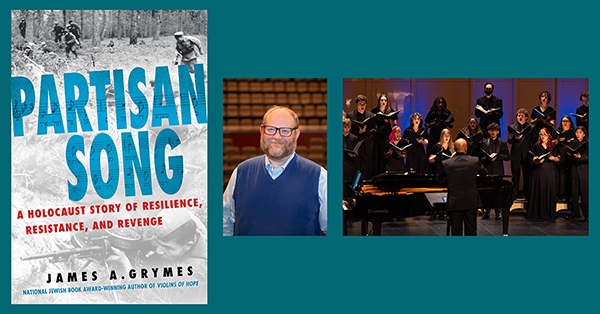
Partisan Song: Stories and Music of Holocaust Resistance – In-Person Program
Speaker: Dr. James A. Grymes
Musical performances by the University Chorale of UNC Charlotte, Dr. Jason Dungee, Director
A civil engineer and amateur musician, Moshe Gildenman had never even held a weapon until the Nazis invaded his hometown in Ukraine and killed 2,200 Jews, including his wife and daughter. Vowing revenge, he escaped to the forest with his son and formed one of the most successful partisan units in the guerilla war to fight the Nazis.
In his latest book, Partisan Song: A Holocaust Story of Resilience, Resistance, and Revenge, historian and National Jewish Book Award-winning author James A. Grymes chronicles the electrifying story of how this peaceful community member became a fierce resistance leader, and how music fueled his courage.
Join us for an evening of storytelling and music, as Grymes and the University Chorale of UNC Charlotte present readings from Partisan Song interspersed with performances of songs that inspired heroism during the Holocaust – music from the Yiddish songbook that Gildenman carried through the war, reconstructions of songs he composed in the ghetto and forest, and beloved anthems such as "Zog nit keyn mol." Grymes will also briefly introduce each song and English translations will be projected onscreen.
The program will be followed by a reception where the book will be available for purchase and signing.
This program is presented by the University of North Carolina at Charlotte and is supported in part by the Crane Family Charitable Foundation and the Blumenthal Foundation.
About the Speaker
Dr. James A. Grymes is a critically acclaimed author who frequently appears as a public speaker at libraries, museums, synagogues, and universities, as well as prominent venues such as the United Nations Headquarters, Weill Recital Hall at Carnegie Hall, the American Israel Public Affairs Committee (AIPAC) Policy Conference, and the historic 16th Street Baptist Church in Birmingham, Alabama. An internationally respected musicologist, he has been featured in interviews by The New York Times, The Wall Street Journal, ABC News, and CNN. Dr. Grymes lives in Charlotte, North Carolina, where he is Professor of Musicology at the University of North Carolina at Charlotte. He is a recipient of a National Jewish Book Award for his earlier work Violins of Hope: Instruments of Hope and Liberation in Mankind's Darkest Hour.
About the Chorale
The University Chorale of UNC Charlotte (above photo: credit Toby Schuetze), directed by Dr. Jason Dungee, is the flagship choral ensemble of the UNC Charlotte Department of Music. Consisting of both music majors and nonmajors, the Chorale proudly serves as ambassadors of the music department and the University at large, frequently performing in the greater Charlotte area and various locations throughout the southeastern United States. The Chorale has participated in several prestigious performances both domestically and abroad, including in Madrid, Spain for the 25th Anniversary Gala of the Gredos San Diego schools, and Venice, Italy, at the historic St. Mark’s Basilica.
Ticket Info: Free; registration is required.
Presented by:
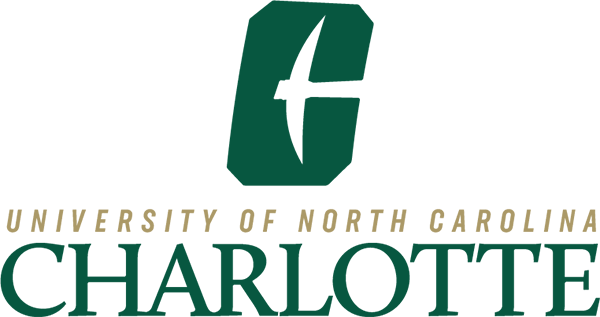
Co-presented by:

book talk and concert
lecture
‘Making a Scene’: Returning a Jewish Comic Opera Star to the Stage - Live on Zoom
Leonora Braham (1853-1931), creator of five principal soprano roles in Gilbert and Sullivan’s operettas between 1881 and 1887 (including Yum-Yum in The Mikado, 1885), first appeared in my research during a visit to the West London Synagogue archives in 2015. As Leonora Abraham, she sang in the Synagogue’s choir between 1870 and 1874, prior to her first professional engagement with the German Reed Entertainments. Having featured Braham’s life and work in two further pieces of scholarship, I was inspired by her opening words in a 1930 interview, ‘So someone has found me at last’, to write The Honour: a new 45-minute play with music which returns Braham to the environment in which she was happiest and best known.
This presentation gives an overview of Braham’s life on- and off-stage, and describes the reasons for and methods involved in giving her a platform beyond traditional scholarly materials. Danielle Padley will discuss the challenges of incorporating the subject of a performer’s Jewish background into theatre intended to appeal to and educate a wide and varied audience, and will look ahead to plans for incorporating more performative media into her research on Jewish music-making in Victorian England.
About the Speaker
Dr. Danielle Padley is a musicologist specialising in Jewish music-making in nineteenth-century England. She investigates musical activities within geographically and socially diverse Jewish communities to enhance and challenge accepted narratives about Jewish life in England. She is a Research Fellow at the Woolf Institute and an Affiliated Lecturer at the Faculty of Music, University of Cambridge, where she teaches the module ‘Music at the Margins of Victorian Society’. Danielle has an interdisciplinary publication and research record which explores Jewish musical activity in a variety of contexts, including synagogue worship, education, theatre, concert and drawing-room entertainments, and literary fiction. She is a trained singer and theatre performer, regularly performing both established and new writing within Cambridge’s local theatre scene. She grew up singing in and conducting synagogue choirs, and for nearly 12 years was Musical Director of Cambridge’s Hebrew choir, Kol Echad. Danielle also sings and plays violin, keys, and folk harp with folk-rock band Once Again.
Ticket Info: Free; registration is required.
Presented by:


lecture
book talk
She Made the Earth Move: Carole King and Jewish Identity - In-person Program
This presentation features a book talk by journalist and author Jane Eisner on Carole King: She Made the Earth Move, in which she traces the professional accomplishments and personal challenges of pop icon Carole King, exploring her unique contribution to American music.
Carole King’s extraordinary career has defined American popular music for more than half a century. Born in New York City in 1942, she shaped the soundtrack of 1960s teen culture with such songs as “Will You Love Me Tomorrow,” one of many Brill Building classics she wrote with her first husband, Gerry Goffin. She was a leading figure in the singer-songwriter movement of the 1970s, with dozens of Billboard Hot 100 hits and music awards—her 1971 album Tapestry won a record four Grammys. Yet she struggled to reconcile her fame with her roles as a wife and mother and retreated to the backwoods of Idaho, only to emerge in recent years as a political activist and the subject of the Tony-winning Broadway show Beautiful: The Carole King Musical.
In her book, Eisner places King’s life in historical and cultural context, revealing details of her humble beginnings in Jewish Brooklyn, the roots of her musical genius, her four marriages, and her anguish about public life. Drawing on numerous interviews as well as historical and contemporary sources, this book brings to life King’s professional accomplishments, her personal challenges, and her lasting contributions to the great American songbook.
About the Speakers
Jane Eisner is an accomplished journalist, educator, and nonprofit leader. She is author of Carole King: She Made the Earth Move from Yale University Press. Former editor-in-chief of the Forward and longtime Philadelphia Inquirer editor, she teaches, consults, writes widely, and speaks nationally on journalism, music, and Jewish life.
Ticket Info: Free; registration is required.
Presented by:


book talk
lecture
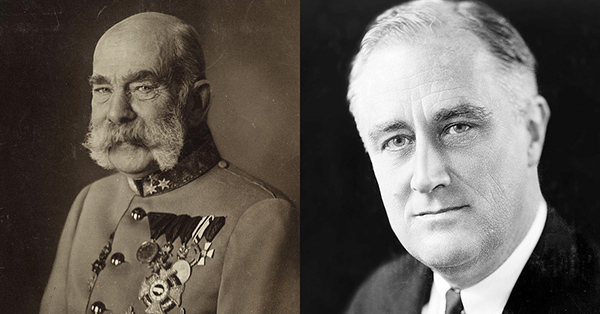
67th Leo Baeck Memorial Lecture by Marsha Rozenblit - Was New York Like Vienna? - In-person Program
Jews who fled Nazi Austria after the Anschluss in 1938 went to many places, but primarily to the United States, where they tried to make new homes for themselves. In so doing, many of them imagined that democratic America resembled the old Habsburg Monarchy, with its tolerance for ethnic diversity. They even imagined that the American president, Franklin Delano Roosevelt, was like the beloved Habsburg Emperor Franz Joseph, and New York was like Vienna. This talk will explore how Jews from Austria coped with American realities and used nostalgia for the Habsburg Monarchy as a way to adjust to their new lives in America.
About our Speaker
Marsha L. Rozenblit is the Harvey M. Meyerhoff Professor of Modern Jewish History at the University of Maryland, where she has been on the faculty since 1978. A social historian of the Jews of the Habsburg Monarchy and its successor states, she is the author of two scholarly books: The Jews of Vienna, 1867-1914: Assimilation and Identity (State University of New York Press, 1983); and Reconstructing a National Identity: The Jews of Habsburg Austria during World War I (Oxford University Press, 2001). She has also co-edited two books: Constructing Nationalities in East Central Europe(Berghahn Press, 2005); and World War I and the Jews: Conflict and Transformation in Europe, the Middle East, and America (Berghahn Press, 2017); and she has written over 35 scholarly articles on such topics as Jewish religious reform in nineteenth century Vienna, Jewish courtship and marriage in 1920s Vienna, and German-Jewish schools in Habsburg Moravia. She served as the president of the Association for Jewish Studies, 2009-2011.
Ticket Info: Free; registration required
Presented by:

lecture
lecture
Holocaust Distortion in Poland: A Comparative European Perspective - Live on Zoom
Holocaust distortion in Poland involves reshaping or minimizing facts about the Holocaust, often emphasizing Polish victimhood while obscuring instances of local collaboration, participation, or indifference. It appears in political rhetoric, memory laws, public commemorations, and attacks on critical scholarship. YIVO’s Poland vs. Holocaust History series examines these dynamics and situates the Polish case within a broader European context.
This lecture by Jan Grabowski will examine the phenomenon of Holocaust distortion in Poland within a broader comparative European framework. It explores how historical narratives about the Holocaust are reshaped, minimized, or selectively reinterpreted in public discourse, politics, education, and law. Particular attention will be paid to the interaction between state-sponsored memory policies, nationalist narratives, and scholarly research, as well as to the pressures faced by historians and educators. By comparing developments in Poland with those in other European countries—including Hungary, Lithuania, Germany, and Russia—the lecture highlights both shared patterns and national specificities in confronting difficult pasts. The discussion addresses legal instruments, public controversies, commemorative practices, and the role of civil society in shaping Holocaust memory. Ultimately, the lecture asks how and why Holocaust distortion emerges, what distinguishes distortion from legitimate historical debate, and what the consequences are for democratic culture, academic freedom, and Europe’s collective understanding of the Holocaust.
Buy Whitewash: Poland and the Jews by Jan Grabowski.
About the Speaker
Jan Grabowski is a Professor of History at the University of Ottawa and a Fellow of the Royal Society of Canada. His interests focus on the Holocaust in Poland and, more specifically, on the relations between Jews and Poles during the war. He has authored/co-authored or edited twenty books and published more than eighty articles published in learned journals in many languages. Grabowski’s book Hunt for the Jews: Betrayal and Murder in German-Occupied Poland has been awarded the Yad Vashem International Book Prize for 2014. In 2018 he co-edited and co-authored “Dalej jest noc” [Night Without End] (a two-volume study of the fate of the Jews in selected counties of occupied Poland). Night Without End was published in 2022 in English by Indiana University Press. Grabowski’s most recent book On Duty: The Role of the Polish “Blue” Police in the Holocaust was published in Poland in March 2020, and the English edition was published in May 2024 by Yad Vashem Presses.
Ticket Info: Free; registration is required.
Presented by:

lecture
lecture
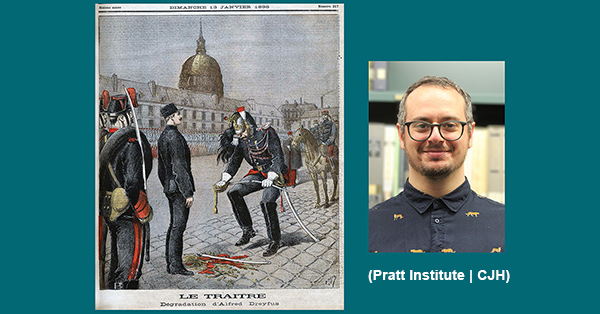
Laughing at the Dreyfus Affair: Cartoon Antisemitism and the Politics of Ridicule - In-person Program
An evening lecture with the Center’s Leon Levy fellow Dr. Andrew Kotick (Pratt Institute | CJH)
The Dreyfus Affair was arguably the most famous political and judicial scandal of 19th century France. It erupted in 1894 when the French officer Alfred Dreyfus (1859-1935) was accused and convicted of being a German spy. Just two years after Dreyfus's conviction and exile, however, the accusations against him were revealed to be an antisemitic conspiracy. In the years that followed, his case went through several appeals, and in the summer of 1906, the verdict against him was overturned.
To this day, the Dreyfus Affair is seen as the culmination of antisemitism in 19th-century France and is remembered in historical memory as a fundamental conflict of values concerning morality and justice in the Third French Republic. At the same time, the affair was also a media spectacle. The Dreyfus Affair occurred in an era when larger print runs for newspapers together with surging literacy rates produced growing numbers of readers in French society. Within this media landscape, Dr. Andrew Kotick's lecture examines the affair from a new perspective by exploring the laughter it provoked. Using satirical caricatures and drawings, he investigates how visual humor shaped the emotional climate of the affair and contributed to making antisemitism a mass phenomenon. Based on examples taken from illustrated press, especially the popular weekly newspaper, Le Rire, Kotick shows how ridicule was used as a political weapon to influence public opinion, define belonging and exclusion, and reshape modern mass politics. By analyzing the visual culture of the affair, Kotick illustrates how laughter became one of the most effective forms of expression in political life.
Co-sponsored by the NYU Center for the Study of Antisemitism and the Institute of French Studies at NYU
Image: Henri Meyer. "Le traître : Dégradation d’Alfred Dreyfus" cover illustration for Le Petit Journal : supplément illustré (13 January 1895). Courtesy of Wikimedia Commons (public domain).
Ticket Info: Free; registration is required.
Presented by:

lecture
book talk
Nazi Germany, Soviet Russia, and the Fate of the Jews - Live on Zoom
In the West, World War II is commonly understood as the Allies’ struggle against Nazism. Often elided, if not simply forgotten, is the Soviet Union’s crucial role in that fight. With World Enemy No. 1: Nazi Germany, Soviet Russia, and the Fate of the Jews, Jochen Hellbeck rectifies this omission by relocating the ideological core of the conflict. It was not the Western powers but Communist Russia that Nazi Germany viewed as an existential threat. Jewish revolutionaries, the Nazis believed, had seized power in 1917 and were preparing the Soviet state to destroy Germany and the world. And so, on June 22, 1941, a German army of three million attacked the Soviet Union to exterminate “Judeo-Bolshevism,” Hitler’s cardinal obsession. While Europe’s Jews were expelled, exiled, and persecuted by the Nazis, Soviet Jews were immediately slated for elimination. The Soviet lands thus became ground zero for systematic extermination, which was only later extended to all Jews, igniting the Holocaust.
Join YIVO for a discussion with Hellbeck about this book, led by historian Jeffrey Veidlinger.
About the Speaker
Jochen Hellbeck is Distinguished Professor of History at Rutgers University, specializing in modern Russia, the Soviet Union, and the history of World War II. The recipient of fellowships from the New York Public Library’s Dorothy and Lewis B. Cullman Center for Scholars and Writers, the John Simon Guggenheim Memorial Foundation, and the American Academy in Berlin, among others, he is the acclaimed author of Stalingrad: The City That Defeated the Third Reich, Revolution on My Mind: Writing a Diary under Stalin, and the online project “Facing Stalingrad.”
Jeffrey Veidlinger is the Joseph Brodsky Collegiate Professor of History and Judaic Studies and Inaugural Director of the Raoul Wallenberg Institute at the University of Michigan. His most recent book, In the Midst of Civilized Europe: The Pogroms of 1918–1921 and the Onset of the Holocaust, won the Stan Vine Book Award and a Canadian Jewish Literary Award. He is also the author of The Moscow State Yiddish Theater: Jewish Culture on the Soviet Stage, Jewish Public Culture in the Late Russian Empire, and In the Shadow of the Shtetl: Small-Town Jewish Life in Soviet Ukraine.
Ticket Info: Free; registration is required.
Presented by:

book talk
workshop
YIVO Learning and Media Center Archival Box Lesson - In-person Program
YIVO is opening the doors to its new Learning and Media Center (YLMC), a publicly accessible space for visitors to come and explore Jewish history and the YIVO Collections.
This workshop will feature YLMC Educator Susannah Trubman leading a guided lesson utilizing the YLMC’s Archival Box Lessons. The program will begin with a brief lecture on the history of the Yiddish theater in Eastern Europe and one of its early pioneers, Esther Rokhl Kaminska. This will be followed by an exploration of primary source materials relating to the life of Esther Rokhl Kaminska, and a group discussion.
Space is limited! Sign up today to be among the first to see the YLMC. All registrants will receive a YIVO mug of their choice.
Ticket Info: Free; registration is required.
Presented by:

workshop
film screening
You Have Courage, Madame - In-person Program
The short film You Have Courage, Madame by Asaf Galay examines the life and work of Polish-Jewish photographer Julia Pirotte. The film is based on Pirotte’s Yiddish testimony from the Fortunoff Video Archive for Holocaust Testimonies and follows two photographers, Avishag Shaar-Yashuv and Irene Pletka, as they trace her journey through Poland and France. The artists embark on an inner and outer journey through Poland and the streets of Marseille, visiting the places Julia Pirotte lived and the sites she photographed, meeting people who knew her, and bringing a contemporary perspective to her unique legacy.
Join us for a screening of this film followed by a conversation with Galay, Pletka, producer Naama Pyritz, and scholar Barbara Kirshenblatt-Gimblett.
Watch the trailer:
Ticket Info: $15; YIVO members: $10
Presented by:

film screening
lecture
Klezmer and Other Displaced Musics in America - Live on Zoom
In this lecture, scholar and performer Walter Zev Feldman explores the vibrant, yet largely concealed, background of the klezmer revitalization in New York, Philadelphia and other American cities in the 1960s, decades after the period when America served as a crucible for immigrants and their diverse musical expressions. Drawing from his new memoir, From the Bronx to the Bosphorus, (Fordham University Press) Feldman will reflect on how he was instrumental in creating the klezmer revitalization in the US after learning from Greek immigrant musicians and then from the eminent klezmer Dave Tarras (1897-1989).
This program is supported, in part, by public funds from the New York City Department of Cultural Affairs, in partnership with the City Council.
About the Speaker
Walter Zev Feldman is a leading researcher in Ottoman Turkish and Jewish music, instrumental in the 1970s Klezmer Revival. His notable works include Klezmer: Music, History, and Memory (2016) and Music of the Ottoman Court: Makam, Composition and the Early Ottoman Instrumental Repertoire (1996; 2024, revised edition). Feldman has extensively studied the instrumental traditions of Moldova’s klezmer and lautar communities. He is the Academic Director of the Klezmer Institute.
Ticket Info: Free; registration is required.
Presented by:

lecture
lecture
Ashkenazi Jewish Food - Live on Zoom
In celebration of YIVO's 101st year, join us for our new Yiddish Civilization 101 series. Each program will highlight key topics in Ashkenazi history and culture, including shtetl life, Jewish humor, and Ashkenazi foodways, amongst others. Guided by expert scholars, each lecture will provide a greater understanding of Jewish life in Eastern Europe and its diasporas.
Ashkenazi Jewish foodways embrace numerous regional culinary cultures from Eastern and Central Europe. They are notable for using locally available ingredients to conform to the rituals of Jewish life, most distinctively the slow-simmered stews that developed for the Sabbath. Robust grains like barley and buckwheat, tangy dill pickles and pickled herring, comforting chicken soup with matzo balls or kreplach, and sweet pastries stuffed with poppyseed and nuts are some of the most characteristic flavors. When masses of Jews migrated to America in the late nineteenth century, they faced not only unfamiliar foods but also challenges to their culinary practices. This lecture by Darra Goldstein will discuss how Ashkenazi Jews adapted to life in their new country by adopting unfamiliar ingredients and engaging in debates about nutrition and the importance of domestic traditions, all the while keeping the beloved flavors of the Old Country intact. The lecture will conclude with a look at the American Jewish foodscape today.
About the Speaker
Darra Goldstein is the Willcox B. and Harriet M. Adsit Professor of Russian, Emerita at Williams College and Founding Editor of Gastronomica: The Journal of Food and Culture, named the 2012 Publication of the Year by the James Beard Foundation. She has published widely on literature, culture, art, and cuisine and consulted for the Council of Europe on using food to promote tolerance and diversity. Goldstein has also authored five award-winning cookbooks, including The Georgian Feast (1994 IACP Julia Child Cookbook of the Year) and is series editor of California Studies in Food and Culture (University of California Press). In 2013, she was named Distinguished Fellow in Food Studies at the Jackman Humanities Institute, University of Toronto, and in 2016 held the Macgeorge Fellowship at the University of Melbourne.
Ticket Info: Free; registration is required.
Presented by:

lecture
lecture
The Cantorial “Golden Age” in America - Live on Zoom
In this lecture demonstration, scholar-musician Jeremiah Lockwood discusses some of the major stars of the cantorial “golden age” and takes a deeper look at the emergence of khazones (the Yiddish word for cantorial music) as a form of popular culture in the US in the early 20th century. Taking over from Europe as the center point of cantorial culture after World War I, cantors in America were major stars of radio, concert, Yiddish theater, and even the emerging sound film industry. Alongside the popularity of cantors as artists and public representatives of Jewish culture there developed a discourse of critique of cantors and their populist art, sometimes referred to as hefker khazones (cantorial music of abandonment) by critics. This lecture will explore the phenomenon of cantorial music as popular culture and will include samples of historic recordings of American cantors of the Jewish immigrant era.
This program is supported, in part, by public funds from the New York City Department of Cultural Affairs, in partnership with the City Council.
About the Speaker
Jeremiah Lockwood is a scholar and musician, working in the fields of Jewish studies, performance studies, and ethnomusicology. He is the founder of the band, The Sway Machinery, and is currently a Fellow at the Katz Center for Advanced Judaic Studies at UPenn. His work engages with issues arising from peering into the archive and imagining the power of “lost” forms of expression to articulate keenly felt needs in the present. His book Golden Ages: Hasidic Singers and Cantorial Revival in the Digital Era was published by University of California Press in 2024.
Ticket Info: Free; registration is required.
Presented by:

lecture
panel discussion
The Future of Holocaust Memory: Poland and Beyond - Live on Zoom
Holocaust distortion in Poland involves reshaping or minimizing facts about the Holocaust, often emphasizing Polish victimhood while obscuring instances of local collaboration, participation, or indifference. It appears in political rhetoric, memory laws, public commemorations, and attacks on critical scholarship. YIVO’s Poland vs. Holocaust History series examines these dynamics and situates the Polish case within a broader European context.
This discussion panel will reflect on the future of Holocaust memory in Poland and in a broader international context. Bringing together Jan T. Gross, Elzbieta Janicka, and Jan Grabowski, the conversation will address the evolving challenges facing Holocaust remembrance amid political polarization, historical revisionism, and generational change. The panelists will consider the roles of scholarship, education, public debate, and cultural institutions in sustaining honest engagement with the past. The discussion will also explore how national and transnational perspectives can coexist, and what is at stake for historical truth, democratic values, and moral responsibility in shaping the future of Holocaust memory.
Buy Whitewash: Poland and the Jews by Jan Grabowski.
About the Speaker
Jan T. Gross is the Norman B. Tomlinson ‘16 and ‘48 Professor of War and Society, Emeritus at Princeton University. He was a 2001 National Book Award nominee for his widely acclaimed Neighbors: The Destruction of the Jewish Community in Jedwabne, Poland. His most recent book, Fear: Anti-Semitism in Poland after Auschwitz, was named one of the best books of the year by The Washington Post.
Elzbieta Janicka is a historian of literature, cultural anthropologist, and visual artist. She received her M.A. at the Université Paris VII Denis Diderot and her Ph.D. and postdoctoral degree at Warsaw University. Janicka is the author of Sztuka czy Naród? [Art or the Nation?] (Kraków: Universitas, 2006) and Festung Warschau [Forteress Warsaw] (Warszawa: Krytyka Polityczna, 2011). She co-authored Philo-Semitic Violence. Poland’s Jewish Past in New Polish Narratives (Lanham, MD: Rowman & Littlefield, 2021; with Tomasz Zukowski) and This Was Not America: A Wrangle Through Jewish-Polish-American History (Boston: Academic Studies Press, 2022; with Michael Steinlauf). Her individual exhibitions are: Ja, fotografia (1998); Miejsce nieparzyste [The Odd Place] (2006); and Inne Miasto [Other City] (2013, with Wojciech Wilczyk). Her research pertains to the identity and community building function of Polish antisemitism as well as the place and role of the Polish majority in the structure of the Holocaust. She works at the Institute of Slavic Studies of the Polish Academy of Sciences.
Jan Grabowski is a Professor of History at the University of Ottawa and a Fellow of the Royal Society of Canada. His interests focus on the Holocaust in Poland and, more specifically, on the relations between Jews and Poles during the war. He has authored/co-authored or edited twenty books and published more than eighty articles published in learned journals in many languages. Grabowski’s book Hunt for the Jews: Betrayal and Murder in German-Occupied Poland has been awarded the Yad Vashem International Book Prize for 2014. In 2018 he co-edited and co-authored “Dalej jest noc” [Night Without End] (a two-volume study of the fate of the Jews in selected counties of occupied Poland). Night Without End was published in 2022 in English by Indiana University Press. Grabowski’s most recent book On Duty: The Role of the Polish “Blue” Police in the Holocaust was published in Poland in March 2020, and the English edition was published in May 2024 by Yad Vashem Presses.
Ticket Info: Free; registration is required.
Presented by:

panel discussion
book talk
Songs of Translation: Bene Israel Performance from India to Israel - Live on Zoom
The Bene Israel are a Jewish community from western India who, over centuries, developed a distinctive identity in relation to other Jewish and non-Jewish communities, translating their sounds, words, and practices to have uniquely Marathi Jewish meanings. Some men sing Marathi Jewish songs, but over the past half century, women have assumed the important cultural role of stewarding these songs for the future. As author Anna C. Schultz demonstrates in her new book Echoes of Translation: Audibility and Relationally in Indian Jewish Women’s Songs, the Bene Israel women are translators who creatively mediate the worlds around them through song; while they may not always be visible, they are audible, and this book amplifies their relational soundings.
Schultz explores sonic translation among the Bene Israel through the metaphor of the echo: a resonant, transformative, relational phenomenon. The voices of Bene Israel women today, like Ovid's Echo, resonate empathically with loved ones they have survived, and, faintly, with those they never knew. Singing this repertoire teaches singers and listeners not only how to be Jewish, but also how to be Bene Israel. It also fosters sociality, providing a medium through which women echo one another, sharing cultural expertise while securing affective ties. But women also echo with one another; that is, they collectively and audibly translate sacred texts as embodied experience in the here and now. Women's repertories and practices were shaped in a richly diverse context, colored by interlinguistic translation between Hebrew, Marathi, Hindi, and English, as well as by other forms of cultural translation: translations from Cochin and Baghdadi Jewish to Bene Israel practice, Christian and Hindu religious discourse to Jewish religious discourse, from one ritual context to another, from men to women, from the written page to embodied performance, and from the past to the present.
About the Speaker
Anna C. Schultz is Professor and Chair of Music at the University of Chicago. As an ethnomusicologist and cultural historian, the twin issues animating her research are music’s power to activate profound religious experience and suture communities, and music as power, that is, music’s role in structuring and dismantling caste, race, gender, nation, and class. Her first book is Singing a Hindu Nation: Marathi Devotional Performance and Nationalism (Oxford University Press, 2013), and her second book is Echoes of Translation: Audibility and Relationality in Indian Jewish Women’s Song (Oxford University Press, 2026). Schultz also writes on race, place, and gender in American country music. With Sumanth Gopinath, she was awarded the H. Colin Slim Award by the American Musicological Society, and she received Honorable Mention for the Society of Ethnomusicology’s Jaap Kunst Prize. Dr. Schultz’s research has been supported by Fulbright-Hays, the American Council of Learned Societies, the American Association of University Women, the Franke Institute of the Humanities, and the Neubauer Collegium, among other organizations.
Ticket Info: Free; registration is required.
Presented by:


book talk
concert
Musical Memoir - In-person Program
Join us for a special concert of the New York premiere of Muriel’s Songs (2023) by Eric Chasalow and a performance of Alex Weiser's Coney Island Days (2022), two song cycles that commemorate the composers’ grandmothers and detail how they navigated 20th century American Jewish life in New York City. The program will open with Joan Tower’s Petroushskates (1980).
Muriel’s Songs traverses the tumult of 20th century America from the very personal, intimate, and primarily domestic perspective of Chasalow’s grandmother, Muriel, with each song inhabiting its own musical world with stylistic points of departure from Baroque to Tin Pan Alley, The Beatles, Latin Jazz and Disco to Milton Babbitt. The songs describe Muriel’s experiences coming of age and through adulthood, including piano lessons, marriage, and family vacations.
Coney Island Days sets to music words from an oral history interview with Weiser’s grandmother, Irene, about childhood in the bilingual immigrant world of Coney Island in the 1930s and ‘40s. Irene would buy penny candies, spend days at the movies, explore Coney Island’s rides and beaches, eat at Nathan’s, and spend summers living behind her family’s knish store.
Both song cycles serve as love letters to the composers’ grandmothers and invoke the nostalgia of 20th century New York Jewish life.
This concert will be performed by the Talea Ensemble, followed by a discussion with Chasalow and Weiser.
About the Participants
Drawing from every corner of the soundworld, Eric Chasalow creates genre-defying music. As a mentor and long time arts advocate, he works tirelessly to nurture developing composers and encourage a community with the greatest respect for the arts and artists. Part of the last generation of composers to work at the Columbia-Princeton Electronic Music Center, Eric has received awards from the John Simon Guggenheim Foundation, the New York Foundation for the Arts, the Koussevitzky Music Foundation, Fromm Foundation at Harvard, and the American Academy of Arts & Letters. Eric’s music has been commissioned and performed by numerous soloists and ensembles in the US and abroad including Talea Ensemble (New York), Ensemble Phoenix (Basel), and California EAR Unit (Los Angeles). Eric is the Irving Fine Professor of Music at Brandeis University where he directs the Brandeis Electro-Acoustic Music Studio (BEAMS). He is a proud alumnus of Bates College, studied at New England Conservatory of Music, and earned the DMA from Columbia University, studying primarily with Mario Davidovsky.
Alex Weiser is the Director of Public Programs at the YIVO Institute where he curates programs that explore history with an eye to contemporary Jewish culture. As a composer, Weiser’s debut album and all the days were purple, was named a 2020 Pulitzer Prize Finalist. The album features songs in Yiddish and English sung by Eliza Bagg. A second album, in a dark blue night, features two song cycles which explore Jewish New York history sung by Annie Rosen. Other projects include operas Tevye’s Daughters with librettist Stephanie Fleischmann (American Lyric Theater), andState of the Jews and The Great Dictionary of the Yiddish Language with librettist Ben Kaplan (American Opera Projects).
Recipient of the Chamber Music America/ASCAP Award for Adventurous Programming, the Talea Ensemble has brought to life at least 80 commissions of major new works since it was founded in 2008, including bold and inventive productions combining music and other genres. In addition to a robust NYC performance season, festival engagements have included the Lincoln Center Festival, Donaueschingen Musiktage, Internationales Musikinstitut Darmstadt, Warsaw Autumn, Wien Modern, Vancouver New Music, Time of Music Finland, TIME:SPANS, NY Philharmonic Artist Spotlight Series, and many more. Talea’s recordings have been distributed worldwide on the KAIROS, Wergo, Gravina Musica, Tzadik, Innova, and New World Records labels. Talea supports early-career composers through US school residencies, a commissioning program, and a composer recording workshop.
Ticket Info: $18; ASJM & YIVO members: $12; Seniors & students: $9
Presented by:


concert
book talk
The Afterlife of Yiddish in German-Jewish Culture, 1818–1938 - Live on Zoom
From the late eighteenth century onwards, as growing circles of the German-Jewish population shifted from speaking Yiddish to German, the once-popular early modern corpus of Old Yiddish literature ceased to be published in the German-speaking lands. But this rich literary corpus did not entirely disappear from the cultural landscape of modern German Jews. In A Lingering Legacy: The Afterlife of Yiddish in German-Jewish Culture, 1818-1938, Aya Elyada shows how Old Yiddish texts continued to be retold, translated, adapted, discussed, and explored in the works of nineteenth and early-twentieth-century German Jewish authors.
In doing so, she uncovers a rich afterlife, in which these beloved Yiddish works were not only newly appreciated as historical monuments, but also served as the focus of lively discussions on a range of pertinent topics within modern German-Jewish culture, including tradition and secularization, acculturation and nostalgia, emancipation and antisemitism, gender relations, and religious reform. Illuminating how modern German-Jewish authors engaged with their premodern Yiddish heritage as central to modern Jewish experience and their distinctive cultural identity, this book unfolds a new dimension to German-Jewish history, culture, and literature.
Join YIVO for a discussion with Elyada about this book, led by Samuel Spinner.
About the Speaker
Aya Elyada is Associate Professor in the Department of History at the Hebrew University of Jerusalem. Her research focuses on Yiddish-German encounters and the social history of language and translation. Before joining the Hebrew University in 2012, she was a visiting PhD student at the University of Munich and a postdoctoral fellow at Duke University. She is the author of A Goy Who Speaks Yiddish: Christians and the Jewish Language in Early Modern Germany.
Samuel Spinner is Associate Professor, Zelda and Myer Tandetnik Chair in Yiddish Language, Literature and Culture at Johns Hopkins University. He specializes in Yiddish and German-Jewish literature and culture from the nineteenth century to the present. He is the author of Jewish Primitivism and is currently working on a book on Holocaust memory. He co-edits the German Jewish Cultures series at Indiana University Press and serves on the editorial board of In geveb.
Ticket Info: Free; registration is required.
Presented by:


book talk
book talk
Menachem Kipnis: Yiddish Folklore and Photographs from Interwar Poland - Live on Zoom
Menachem Kipnis (1878–1942) was one of the early twentieth-century’s greatest Jewish Eastern European ethnomusicologists, folklorists, and photographers. He had a weekly column in the Warsaw Yiddish newspaper Haynt, retelling humorous old folk stories about the fictional Polish town of Chelm, populated exclusively by fools. At the same time, his photographs of Jewish life in Eastern Europe regularly appeared in the Forverts (Forward), the most popular Yiddish daily newspaper in the United States.
Menachem Kipnis, edited by Sheila E. Jelen and translated by Raphael Finkel, brings these photographs and stories into dialogue with one another, bridging the Jewish communities in Poland and in America during the interwar period. This dialogue, between image and text, between European metropolis and American metropolis, captures a key historical moment when American Jews sought to imagine the lives of their coreligionists in the “Old Country” and Eastern European urban Jews sought to distinguish themselves from their Jewish compatriots who were still living in the shtetl.
Join YIVO for a discussion with Jelen and Finkel about this book, moderated by Natan M. Meir.
Learn more about Menachem Kipnis in the YIVO Encyclopedia.
About the Speaker
Sheila E. Jelen is a professor in the Divinity School at the University of Chicago. Her scholarship is in the field of modern Jewish literature and culture, with a particular emphasis on gender and Jewish literacy and the intersection between ethnographic, photographic, and literary discourses in popular reconstructions of pre-Holocaust Eastern European Jewish life in Israel and the United States. She is the author of Salvage Poetics: Post-Holocaust American Jewish Folk Ethnographies and Testimonial Montage: A Family of Israeli Holocaust Testimonies from the Cracow Ghetto Resistance.
Raphael Finkel is professor emeritus of computer science at the University of Kentucky. He compiled the first version of the Jargon File. Finkel is also an activist for the survival of the Yiddish language.
Natan M. Meir is the Lorry I. Lokey Chair in Judaic Studies at Portland State University. He is the author of Kiev, Jewish Metropolis: A History, 1859-1914 and Stepchildren of the Shtetl: The Destitute, Disabled, and Mad of Jewish Eastern Europe, 1800-1939. He lectures widely on Jewish history and culture in Ukraine, Russia, Poland, and the Baltics; Jewish folklore and magic; and Jewish disability history. He is now working on a study of lived Judaism that explores the persistence of folk traditions and magical practices in the lives of ordinary Jews.
Ticket Info: Free; registration is required.
Presented by:

book talk
lecture
Yiddish Theater, George Gershwin, and the Birth of an American Sound - Live on Zoom
As a teenager, George Gershwin attended Yiddish theater regularly. Khantshe in Amerike, by family friend Joseph Rumshinsky, featured a working-class woman asserting her rights and her desires. But not only did the show include a Suffragette Parade—it has also been described as the first Yiddish musical to incorporate American rhythm. This lecture by scholar Ronald Robboy will explore the idea that Gershwin’s internalization of Black Americans’ music was influenced by his early immersion in Yiddish theater.
This program is supported, in part, by public funds from the New York City Department of Cultural Affairs, in partnership with the City Council.
About the Speaker
Ronald Robboy is a musician and independent scholar based in San Diego, where he was a professional cellist for many years and, beginning in the 1970s, an early West Coast experimentalist in the klezmer revival. He has written and lectured extensively on Yiddish theater music, and in 1998 was named Senior Researcher for Michael Tilson Thomas’s Thomashefsky Project. Robboy is leading YIVO Institute’s reconstruction of the score to composer Joseph Rumshinsky’s operetta Khantshe in Amerike (1912), to be performed in New York at the Center for Jewish History in May 2026.
Ticket Info: Free; registration is required.
Presented by:

lecture
concert
Khantshe in Amerike — An Operetta by Joseph Rumshinsky - In-person Program and Live on Zoom
Join YIVO for a performance of the music of Khantshe in Amerike, a 1912 operetta with music by Joseph Rumshinsky, play by Nokhem Rakov, and lyrics by Isidore Lillian.
Premiered in New York City, Khantshe in Amerike was subsequently performed around the world. The show was a turning point in Rumshinsky’s output, noted for having put “American rhythm” on the Yiddish stage for the first time according to Yiddish theater historian Zalmen Zylbercweig (1894–1972). Khantshe was also a star vehicle which marked a pivotal moment in the career of singer, actor, and impresario Bessie Tomashefsky.
Khantshe in Amerike is a musical comedy whose action revolves around an independent minded young woman named Khantshe who dresses as a man and becomes the chauffeur for the wealthy Rubin Goldhendler. The show touches on serious topics including love, gender, women's suffrage and the changing social status of women in turn-of-the-century America.
Reconstructed from a variety of archival materials collected at YIVO—including from the recently donated Tomashefsky Archive from Michael Tilson Thomas—the operetta will be performed by students of the Bard Conservatory Vocal Arts Program.
The Sidney Krum Young Artists Concert Series is made possible by a generous gift from the Estate of Sidney Krum.
This program is supported, in part, by public funds from the New York City Department of Cultural Affairs, in partnership with the City Council.
Ticket Info:
In Person: $15; YIVO members & students: $10
Livestream: Free; registration is required
Presented by:

concert
book talk
Malka Owsiany Recounts by Mark Turkow - Live on Zoom
First published in Yiddish in 1946 and translated into Spanish in 2001, Malka Owsiany Recounts...: A Chronicle of Our Time by Mark Turkow is now available for the first time in English. Malka Owsiany was only 20 years old when she described the horrors of the Holocaust to Yiddish writer and Jewish community leader Mark Turkow. Malka’s account was among the first Holocaust testimonies available in the immediate postwar years. She discusses rebuilding her life and marrying a fellow survivor, Meir, as well as her memories of the rich Polish Jewish communal life from her youth that was destroyed by the Nazis.
Join us for a talk with translator Sandra Chiritescu about this English translation, in a discussion led by Rachelle Grossman.
About the Speakers
Sandra Chiritescu is Clinical Assistant Professor of Yiddish at New York University. She has previously taught Yiddish at Columbia University and the Worker’s Circle. She holds a BA in German philology from the University of Zurich and a PhD in Yiddish Studies from Columbia University. Her dissertation “Bubbes, Mames and Daughters: Uncovering Twentieth- and Twenty-First Century American Jewish and American Yiddish Feminist Genealogies” brings together her research interests in Yiddish literature and culture, American Jewish literature, feminist and queer theory, and translation theory. Her translation of an early Holocaust survivor testimony from 1946 by a woman is available under the title Malka Owsiany Recounts (Cherry Orchard Press, 2025).
Rachelle Grossman is an assistant professor of comparative literature at the University of Illinois, Urbana-Champaign. Her work focuses on the intersection of Yiddish and its transnational connections with other literatures, languages, and cultures. In her research, she develops a geopolitical approach to literature, focusing especially on the transformation of literary centers and peripheries in the postwar period. She is also interested in technologies of print and how they impact literature as material culture.
Ticket Info: Free; registration is required.
Presented by:

book talk
workshop
Community Read: The Yiddish Sherlock Holmes - In-person Program
Meet Max Spitzkopf: legendary private eye, undefeated foe of villains, and passionate defender of the Jewish people. No matter how hopeless or dangerous the case, when “the investigatory profession’s greatest artist” is summoned, justice is assured. Aided by his trusty assistant, Fuchs, super-sleuth Spitzkopf deploys equal parts physical bravery and intellectual ingenuity—not to mention a knack for stealthy disguise—to unpick evil conspiracies, outwit the canniest of criminals, and restore moral order to the world. Giving a unique twist to a beloved literary genre, Spitzkopf’s mysteries are a vibrant testament to Jewish life, in all its variety, during the last years of the Austro-Hungarian Empire.
Join us for a beshutfesdike leyenung, or a “Community Read.” Led by translator Mikhl Yashinsky, attendees will read selections of the original Yiddish text from Adventures of Max Spitzkopf: The Yiddish Sherlock Holmes by Jonas Kreppel.
Read a selection of the text in Yiddish, transliteration, and English translation.
About the Speaker
Mikhl Yashinsky is a writer, singer-actor, and teacher in Manhattan. He was born in Detroit and graduated with a degree in modern European history and literature from Harvard. His “Di psure loyt khaim” (The Gospel According to Chaim), put on by New Yiddish Rep in 2024, was hailed as the first new full-length Yiddish-language drama produced professionally in the United States, outside of the Hasidic world, for many decades and “jolted the repertoire with a work that is both traditional and delightfully subversive” (Forward). His Yiddish-language erotic one-act “Vos flist durkhn oder” (Blessing of the New Moon) premiered at 2022’s Lower East Side Play Festival. With National Yiddish Theatre Folksbiene, he has performed in “Fidler afn dakh” (Fiddler on the Roof) directed by Joel Grey, “Tsvishn falndike vent” (Amid Falling Walls) and “Di kishef-makherin” (The Sorceress), in which Mikhl brought a “keen, if malevolent, psychology” to the title role (New York Times). In 2023, Yashinsky made his Carnegie Hall début, singing the anthem of the Vilna Partisans in the Holocaust memorial concert “We Are Here.” He has taught Yiddish at Columbia, University of Michigan, Tel Aviv University, UMass Amherst, the Yiddish Book Center, YIVO, and The Workers Circle, and co-authored the award-winning textbook In eynem. His translations of the memoirs of Ester-Rokhl Kaminska, the “Mama of Yiddish Theatre,” and the detective stories of Max Spitzkopf, the “Yiddish Sherlock Holmes,” were published in 2025 by Bloomsbury and the Yiddish Book Center, respectively. More information on his website: www.yashinsky.com
Ticket Info: Free; registration is required.
Presented by:

workshop
book talk
The Interracial Left and the International Workers Order, 1930–1954 - Live on Zoom
From Popular Front to Cold War tells the story of the International Workers Order (IWO), an organization founded in 1930 to provide life, burial, and health insurance to its members. The IWO broadened its mission to promote interracial solidarity, support labor unions, combat racism and antisemitism, and champion progressive social programs from the Great Depression into the postwar era.
At its height, the IWO had almost two hundred thousand members drawn from a broad ethnic and racial spectrum of the working class. It operated summer camps, published foreign-language newspapers, and supported a wide range of cultural activities. An early advocate for the United States' entry into World War II, the IWO was also ahead of its time in championing the nascent civil rights movement. After the war, it was declared a subversive organization due to its ties to the Communist Party and disbanded in 1954, though its legacy as a model for working-class cooperation across racial and ethnic differences endures to this day.
Join editor Elissa Sampson and contributors Jennifer Young and Felicia Bevel about this book, in a discussion led by Kate Rosenblatt.
About the Speakers
Elissa Sampson is a Research Associate in Cornell University's Jewish Studies Program. She is an urban geographer who studies how the past is actively used to create new spaces of migration, memory, heritage, and activism. Her life-long interest in migration, diaspora, re-diasporization, and culture has been pursued in the Lower East Side, Brooklyn, Jerusalem, Paris, and elsewhere and points to the dynamic interactions among diasporas in shared spaces/places.
Jennifer Young is the Education Program Manager at the Yiddish Book Center. Jennifer served as the Director of Education at the YIVO Institute, where she also worked as Digital Learning Curator to produce YIVO's first online class, Discovering Ashkenaz. She has also worked at the Tenement Museum, the Lower East Side Jewish Conservancy, and the New York Historical Society. Jennifer received a B.A. in Anthropology and Jewish Studies from McGill University and an M.A. in Anthropology from the University of Illinois. After completing doctoral studies in Jewish history at NYU, she received an M.Ed in Museum Curriculum and Pedagogy from the University of British Columbia. She also serves as part of a scholars' working group dedicated to research and scholarship of the Yiddish Left, sponsored by Cornell University.
Felicia Bevel is an Assistant Professor of History at the University of North Florida. Her research and teaching interests include African American history, twentieth century U.S. history, cultural history, and childhood studies. Her current research examines early twentieth century American cultural productions that romanticized the Old South and circulated outside the U.S. within the larger Pacific world, specifically in Canada and Australia. Her work has been supported over the years by the Ford Foundation, ACLS, and Florida Education fund. At UNF, she teaches courses such as the Civil Rights Movement, the Black Pacific, and Blackness in Archives and has served on the advisory boards of the Digital Humanities Institute and Africana Studies. She is also a faculty member on the Red Hill Cemetery Project, a collaboration between UNF and the Okefenokee Heritage Center and Black Hertiage Committtee to document the history of an African American cemetery in Waycross, GA.
Kate Rosenblatt is the Jay and Leslie Cohen Assistant Professor of Religion and Jewish Studies at Emory University. She is a historian of American religion with a focus on the history and experience of American Jews. She earned a BA in American history from Columbia University (2006), a BA in Bible and Ancient Semitic Languages from the Jewish Theological Seminary (2006), and both an MA in Jewish Studies (2009) and a PhD in American history (2016) from the University of Michigan. Her first book, Cooperative Battlegrounds: Farmers, Workers, and the Search for Economic Alternatives (under contract, History of American Capitalism series, Columbia University) details the efforts of a coalition of Americans – workers, farmers, religious clergy and their laities, labor activists, reforms, state and federal bureaucrats, and others – to put forward an alternative expression of American capitalism by way of producer and consumer cooperatives across the twentieth century. She is also at work on a second book project, a reappraisal of the post-World War II American Jewish left.
Ticket Info: Free; registration is required.
Presented by:

book talk
book talk
Eastern European Jewish Immigrant Bankers and the Shaping of American Finance, 1873–1930 - Live on Zoom
What are immigrants to do when business opportunities abound in their new home, but banks refuse essential financial support? How could they make the journey in the first place without helping hands? In this lively history, Rebecca Kobrin chronicles the turn-of-the-twentieth-century Jewish immigrants who stepped up by doing the lending themselves. Arriving from the Russian Empire and settling primarily in New York, they made livelihoods by assisting fellow Jews, so they could purchase passage to the United States and, after arriving, obtain credit that other lenders would not dare provide. Drawing on previously unexamined archival materials in Russian, Yiddish, German, and English, Credit to the Nation traces the novel practices of bankers who not only enabled the flourishing of American Jewry, but also revolutionized the US financial industry.
Join us for a discussion with Kobrin about this book, led by Annie Polland.
About the Speakers
Rebecca Kobrin is the Russell and Bettina Knapp Associate Professor of American Jewish History at Columbia University. She works in the fields of immigration history, urban studies, business history, Eastern European history and American Jewish History, specializing in modern Jewish migration. She received her B.A. (1994) from Yale University and her Ph.D. (2002) from the University of Pennsylvania. She served as the Blaustein Post-Doctoral Fellow at Yale University (2002-2004) and the American Academy of Jewish Research Post-Doctoral Fellow at New York University (2004-6). Her book Jewish Bialystok and Its Diaspora (Indiana University Press, 2010) was awarded the Jordan Schnitzer prize (2012). She is the editor of Chosen Capital: The Jewish Encounter with American Capitalism (Rutgers University Press, 2012), Salo Baron: Using the Past to Shape the Future of Jewish Studies in America (Columbia University Press, 2022), and is co-editor with Adam Teller of Purchasing Power: The Economics of Jewish History (University of Pennsylvania Press, 2015).
Annie Polland is a public historian, author, and President of the Lower East Side Tenement Museum, where she served as Vice President for Programs and Education from 2009 to 2017. Prior to her return to the Tenement Museum, she served as Executive Director of the American Jewish Historical Society. She is the co-author, with Daniel Soyer, of Emerging Metropolis: New York Jews in the Age of Immigration (New York University Press, 2013). She served as Vice President of Education at the Museum at Eldridge Street, where she wrote Landmark of the Spirit: The Eldridge Street Synagogue (Yale University Press, 2008).
Ticket Info: Free; registration is required.
Presented by:


book talk
book talk
Polish-Jewish Masculinities and the Challenge of Modernity - Live on Zoom
At the turn of the twentieth century, Jewish men in Eastern Europe lived in a social reality in which both Jewish and non-Jewish men and women tested, debated, and redesigned masculinities. Men of Valor and Anxiety by Mariusz Kalczewiak explores how religion, class divisions, antisemitism, new domesticity, and militarization changed masculine ideas and practices in Eastern Europe between the 1890s and 1930s. Kalczewiak’s study ventures into the military barracks, yeshivot study halls, fraternity parties, and Jewish homes to demonstrate how complex Jewish masculinities were between orthodoxy, acculturation, Polish and Jewish nationalisms, and changing notions of domesticity and profession. Men of Valor and Anxiety is the first book to demonstrate how the links between ethnicity and gender were constructed within both global and local contexts.
Join YIVO for a discussion with Kalczewiak about this book, led by Miriam Mora.
About the Speakers
Mariusz Kalczewiak is a Professor of Jewish Studies at the University of Lucerne, Switzerland. He is a social and cultural historian of modern Jewish history, with a focus on Latin America and Eastern Europe. His award-winning book Polacos in Argentina: Polish Jews, Interwar Migration, and the Emergence of Transatlantic Jewish Culture was published in 2020 with the University of Alabama Press. His second book Men of Valor and Anxiety: Polish-Jewish Masculinities and the Challenge of Modernity came out in 2025 with Indiana University Press.
Miriam Mora is a historian of American immigration and ethnic history, with a focus on Jewish American gender identity. Her areas of research interest and specialization include modern Jewish history, gender and antisemitism, genocide studies, Holocaust memory and representation in pop culture, masculinity, history of Irish conflict, and American Jewish acculturation. Her first book, Carrying a Big Schtick: Jewish Acculturation and Masculinity in the Twentieth Century was released from Wayne State University Press in 2024. She previously served as Academic Director at the Center for Jewish History in New York City.
Ticket Info: Free; registration is required.
Presented by:

book talk